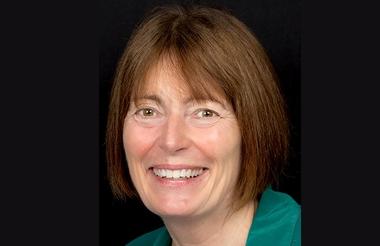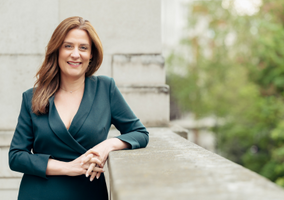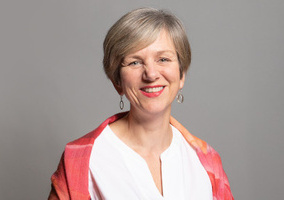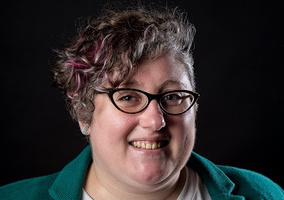Before entering the charity sector, Clare Pelham’s career included several senior roles in government and working as Coca-Cola’s director of active lifestyles.
Reflecting on her time at the soft drinks giant, Pelham says: “I do remember once seeing a figure realising that what we were spending on one research project was bigger than the entire Home Office research budget covering all of criminal justice.”
But before working in the public or private sectors, Pelham volunteered for residential care charity Leonard Cheshire, which she later led for six years before starting her current role as chief executive of the Epilepsy Society.
Pelham says she does not have the patience to stay in one job for too long but says the unique support and encouragement she has received in the charity sector is “hard to give up”.
A burgeoning interest in procurement
After graduating from university, Pelham joined the civil service and worked her way up to head of police strategy in the Home Office.
While there, she interviewed for a role at rapidly expanding multinational technology corporation IBM, despite a job not being advertised.
“I called the director of corporate affairs at IBM and said: ‘I’d like to come and talk to you about why it would be a good idea for you to employ me'.
“And she said to me: ‘I’ll give you 15 minutes’.”
Pelham’s pitch to the company was that her understanding of the UK public sector could help it to secure more government contracts.
“As a consequence of that 15-minute conversation, I was offered a job there – head of customer satisfaction in the SME [small and medium enterprises] department.”
Pelham says her time at IBM signified “the beginning of my real interest in procurement”.
She then became director of corporate affairs at the prison service, where she oversaw the embedding of its IT infrastructure through a private finance initiative. “It was an absolute education in, first of all, how not to do it. But then also when we did it properly, how it could be done.”
It was a challenging technical role but Pelham says one of the things she is most proud of is working on the prison service’s partnership with JobCentre Plus. “I was able to connect a prisoner coming up for discharge with Jobcentre Plus, so that they could have a job to go to on discharge.”
Working on 9/11 response
Terrorist attacks in the US led to Pelham taking on a “scary job” that involved “lots of serious responsibilities”.
“9/11 happened and I was asked by the cabinet secretary and the prime minister to go and supervise the UK response,” says Pelham.
“So, the next day I was in the Cabinet Office in one of the conference rooms. I was literally sitting in that office within hours and putting in place the plans that we needed to keep the country safe.
“But actually, in our response to 9/11, I would say the government really did distinguish themselves. It was instant. It was quick. It was dedicated. It was efficient.”
However, Pelham found that the government “had relatively few experts on how to provide information quickly to the public” and she moved to Coca-Cola to improve her expertise in this area.
Her meeting with the soft drinks company’s president, she says, “was one of the most intriguing job interviews I have ever had”. He asked Pelham questions and rated her answers out of 10 immediately then offered her a second chance to respond. “One of the many things I learned, then and there on that day, is give people straight feedback, and enable them to improve.”
Pelham moved back to the civil service, initially leading a government inquiry before setting up the Judicial Appointments Commission in 2006.
She was approached about becoming a trustee at Leonard Cheshire, where she had previously volunteered, in 2010. At the interview, she was told the charity was advertising for a CEO role in a few days and was asked if she wanted to apply. “Three weeks later, I was chief exec of Leonard Cheshire.”
Not wanting to stay too long
Pelham led Leonard Cheshire for six years before resigning, partly due to her belief that leaders should not stay for too long at one organisation.
“I think it’s important to leave while people are sad for you to go, rather than looking at their watch thinking how much longer you’re going to be here. I think that’s important, because I think it’s very unhealthy for an organisation if it becomes a fan club, and everything has to be done one way. So actually, not everybody agrees with this, but I think in general, it’s a good idea for leadership to rotate everyone somewhere between five and 10 years.”
On leaving Leonard Cheshire without another role lined up, Pelham says: “I’m still not sure if it was right, to be honest. I don’t know but if my previous experiences told me anything, it was that there’s usually something quite interesting around the corner if you’re open to it.”
Around the corner was Pelham’s current role as CEO of Epilepsy Society, which she began in 2016 after a short career break.
“It had a particular personal resonance for me because I have epilepsy in my family. And because the research that was going on here was so life-changing, and so fundamental, but not reaching anywhere near the number of people that it could or should.
“The charity wasn’t in great financial health, and really needed to change because the future was not set. And so, I felt that I had something to offer.”
Procurement
One of the skills that Pelham has brought to her charity leadership roles is her knowledge of procurement processes.
“I feel passionately that charities have to take some of the techniques from the commercial world, and use them to support the work we’re doing with disadvantaged people. So, when charities tender for contracts, they often don’t include the ‘extras’ that will be provided.
“The contract might be ‘please provide 10 hours of care for this person’ but a charity provider might not only provide 10 hours of care, they might provide five hours of volunteer time, or two opportunities to holiday free of charge in a year. But they’re often not specified in a response to the contract, because it just answers the question you’re asked.
“And so quite often, by looking at how you reply to tenders, and even more interestingly, how you shape tenders before they’re issued, you can result in a better outcome for the disabled person than then just by answering the questions that you’re asked.”
Pelham gives an example of Leonard Cheshire refusing to apply to a contract to provide 15-minute home care visits and instead successfully campaigning for the practice to be scrapped.
She argues that charities should be in a strong position to compete with private providers for contract tenders due to their not-for-profit nature.
“If you’re providing a service, and not being obligated to provide a profit for your shareholders, then shame on you if you can’t provide an equivalent service to the one that the private sector is offering for less money. Because by definition, if they are offering a profit on what they’re providing, then it must cost them more.
“And I think sometimes, charitable providers need to look at themselves a little bit more critically. We have no divine right to win contracts.
“Some charities feel that they do have a divine right to win a contract, but actually, nearly always the commissioner is operating a perfectly fair and transparent system and trying to choose the best service provider for a disadvantaged person. So why would you choose a worse service just because it’s provided by a charity? That seems a very unusual way of carrying on.”
As at many charities, recent inflationary pressures have affected Epilepsy Society’s contract costs.
“I’ve done a lot of work to show commissioners how costs have exceeded beyond the uplift that they've been paying in fees. That’s been persuasive with some and not with others.
“But we continue to do that. We’ve also done a lot of work on efficiency, because just because you’re a charity does not mean you’re efficient.”
Plan to change the way research is funded
Since joining the Epilepsy Society, Pelham has been keen to demonstrate the value of its research and believes that this may has helped the charity to secure more funding.
“We might treat somebody in a way that stops them having seizures. Now, what I've done for the first time is cost that out for the NHS.
“If you’re not having a couple of seizures a week, or for some people 50 a day, what are the savings there to the health service, to the ambulance service and to the British economy? So, we’ve started to do some very rigorous analysis of the economic benefits of this investment.”
Pelham says that showing the Treasury, where she used to work, some “really well-founded data” tends to “go down very well with them”.
However, Pelham says, research funding in the UK from the government and the general public remains largely driven by the popularity of each cause. This can leave research for epilepsy, which affects 1% of the population, under-resourced.
“Fundraising is, despite all our ingenuity and all our marketing expertise, fundamentally driven by a degree of popularity. So, what you would be expecting then, is that there was some sort of compensation from the government. Not so much.
“The more I’ve been learning about it, the more I’m puzzled at the way it’s evolved, actually. For example, epilepsy gets 0.3% of government funding for medical research, which is really quite tiny. And some of that, not all of it, is because governments as well as donors are influenced by popularity.”
Reinvesting a physical asset
Epilepsy Society is headquartered on a 300-acre site in Buckinghamshire, gifted to it 130 years ago to be used as a self-supporting agricultural community for people with epilepsy.
It is no longer used for this purpose in the 21st century, so Pelham is working to best maximise the asset for the good of the charity.
“We currently have 1,200 people dying from epilepsy each year. So, what they need is more research. And I have this valuable land. So, the planning application is to sell less than 40% of it to developers to build houses, and to use all of the funds to employ another 120 researchers, which will move the dial on the research that’s done, not just in the UK, but in the world.”
Epilepsy Society is already ranked as “the world’s number one epilepsy research group” for its work with University College London, Pelham says.
Investing in additional researchers, however, would allow the charity to “treat about three or four times” the number of people it currently does. “We would start to treat tens of thousands of people,” she says.
“If our founders were here today, they would want me to turn what’s a physical asset into an intellectual asset.”
Related articles












